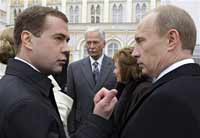Putin returns as prime minister to make the West respect Russia even more
Vladimir Putin, who was Russia's President only two days ago, returns as the prime minister as the State Duma, the Parliament of Russia, approved Putin in a 392056 vote for the position. Russia's new President, Dmitry Medvedev, who was inaugurated on May 7, told lawmakers that Putin had restored the world’s respect for Russia and improved the lives of its citizens.

Medvedev later signed a decree making Putin prime minister.
It goes without saying that Putin’s quick move from No. 1 post to No. 2 position will keep him politically prominent for the future. In addition, Putin may return to presidency after Medvedev’s term in the office expires.
The switch comes after months of political maneuvering by the popular Putin to maintain a role in ruling Russia after stepping down. Barred by term limits from running in the March presidential vote, he anointed Medvedev as his favored successor in December and pledged to serve as his prime minister.
Medvedev formally nominated Putin in one of his first acts as president Wednesday. His confirmation was never in doubt in the Duma, the lower parliament house, where his United Russia party holds 315 of the 450 seats and two of the other three parties also support him.
Presenting his nominee to a rare full house at the Duma on Thursday, Medvedev said lawmakers' applause "means that Vladimir Vladimirovich needs no special recommendation" and credited his mentor with recharging Russia's economy and raising its global stature.
"Russia is respected once again," Medvedev said.
Medvedev suggested Putin would have a strong influence on Russian policy for years to come. He said Putin had been involved in setting goals for the country's development through 2020 and "as Cabinet chairman will play a key role in their realization."
Russia 's president is the undisputed head of state and sets policy on all fronts, while the prime minister heads the Cabinet and is responsible for running the economy. But Putin is expected to have strong influence on Medvedev, who at 42 is 13 years younger and owes his political ascent to his mentor.
Putin's prime ministers, particularly during his second term, served largely as enforcers and fall guys, sometimes shouldering blame for problems and sometimes passing it down the line to Cabinet ministers. Putin, meanwhile, remained above the fray and any hint of criticism on state-run television was taboo.
Putin is expected to play a far stronger role as prime minister. He will also control the Duma and wield power nationwide as chairman of United Russia, a position he assumed last month after leading the party to a sweeping victory in December parliamentary elections.
Putin and Medvedev have stressed they will work together to help Russia modernize its economy, boost social welfare and tackle the severe infrastructure problems that are depleting its population and jeopardizing its future.
"I think nobody doubts that our tandem, our cooperation will only strengthen," Medvedev told lawmakers.
He vowed to tread Putin's path, saying their teamwork would "provide the necessary continuity and development of the course that has been supported by the Russian people."
In his own, far longer speech to lawmakers, Putin said that the "consolidation of political forces and solidarity of society" was imperative for Russia's progress. "We need coordinated work by all branches of government."
Focusing on the economy in the same commanding detail with which he prided himself as president, Putin set lofty goals, saying Russia must be among the top nations in terms of living standards within 15 years and that inflation must be kept in the single digits _ though last year it was over 10 percent.
He said Russia's economy could surpass Britain's this year and become the world's sixth-largest.
Putin also acknowledged problems that have persisted amid the oil-fueled economic recovery that coincided with his presidency. He said Russia must lessen its reliance on its energy resources but also ease taxes to boost sluggish oil production, and warned of the toll taken by the nation's drinking and smoking habits.
Putin took mostly light questions before the vote, with the only complaints coming from Communists who voiced concerns over high inflation and rampant corruption. One lawmaker set up Putin to accuse the West of hampering Russian investors' access to markets.
Each party was allowed a speech, and a red-faced Communist leader Gennady Zyuganov said his faction _ with 57 Duma seats _ could not support the nomination. He blamed Putin's government for Russia's industrial and population decline and criticized his record on democracy.
Ultranationalist Kremlin ally Vladimir Zhirinovsky then came to the podium and to Putin's aid, railing against Zyuganov in a rambling speech that blamed Russia's problems on Communist rule.
A lawmaker from the loyal, left-leaning Just Russia party said Putin "raised Russia from its knees."
Critics say the show of solidarity by mentor and protege masks fears that Putin has navigated Russia into a dangerous period of political uncertainty, with two centers of power taking shape in a potentially debilitating and divisive arrangement.
Under the constitution, the prime minister temporarily replaces a president who dies or is incapacitated.
Putin, 55, a longtime KGB officer, served as prime minister for five months in 1999 under Boris Yeltsin, who stepped down on Dec. 31 of that year and handed him the presidency. Putin was elected to his first term three months later.
Subscribe to Pravda.Ru Telegram channel, Facebook, RSS!

